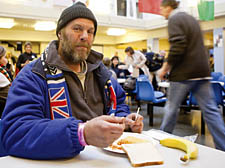| |

Wanted: Additional help for those on the streets |
Study backs soup runs for poor
City council against providing ‘rudimentary’ food handouts on the street
THE controversial practice of handing out free food to homeless people in “soup runs” has been backed by a new study, setting the council on a collision course with outreach workers in the West End.
Westminster City Council has maintained a long-standing opposition to the practice.
The study, Soup runs in Central London: The right help in the right place at the right time? by Laura Lane and Anne Powers of the London School of Economics, has found that soup runs provide a valuable “safety net” to hundreds of rough sleepers who slip under the radar of regular support services.
But the council has been a vociferous opponent of the practice, going as far as trying to outlaw it completely last year.
It claims soup runs reinforce a damaging lifestyle – trapping people in homelessness – rather than helping them address their problems and climb-up onto the housing ladder.
Housing chief Councillor Philippa Roe said large-scale soup run operations were “damaging the health and life chances of rough sleepers”, and she is likely to be disturbed by the study findings, which interviewed hundreds of rough sleepers, service providers, local businesses and residents as part of its research.
Leader of the Labour group Paul Dimoldenberg said the council should make a “full apology” to the charities who provide soup runs in the borough. Criticism is also levelled at soup runs by residents, who claim they cause problems with litter and anti-social behaviour.
The report says: “Soup runs tend to provoke strong and often emotive responses from all involved.
“We have tried to present an independent and objective analysis of these positions in the hope that some middle ground can be uncovered to help move forward discussions of the role of soup runs in Westminster.
“All stakeholders seem to agree that there is a need for some additional or alternative provision for those on the streets who are unable or unwilling to access current, often building-based services; for those who have been homeless and are struggling in new accommodation with limited support and social contact; and for those who are housed yet poor, vulnerable and isolated.
“It remains clear that soup runs, with their tolerant, open-access, and understanding ethos alongside committed knowledgeable and well meaning volunteers, can access many vulnerable people who may not be reached through existing mainstream service provision.”
There is a well established timetable of soup runs organised by voluntary groups in the borough, with Soho, Marble Arch, Victoria and the Strand the most popular. The report has also made a number of recommendations to improve the service. These include more support for the West End’s sizeable foreign homeless community, more provision indoors and increased mentoring from volunteers.
Cllr Roe, cabinet member for housing, said: “Cllr Dimoldenberg is simply wrong about Westminster’s rough sleeping strategy.
“We, of course, share the concerns of others for the vulnerability of rough sleepers, but as the LSE study makes clear, the over-provision of unco-ordinated soup runs in Westminster does little to assist people to move off the street.
“In fact we believe there is evidence they act as a magnet bringing people back onto the street and contribute to them remaining rough sleepers.
“This is not just our view but is also shared by a number of leading homeless charities including Thames Reach, Look Ahead Housing and Care and the English Churches Housing Group as well as Big Issue founder John Bird.
“Rough sleeping damages a person’s life chances and their needs are best served through accessing the many services offered by councils, charities and other organisations.
“We believe that in 2009 there is no justification for providing rudimentary food handouts on the street. Services should be provided indoors and geared towards helping people move away from rough sleeping.” |
 |
|
 |
| |
| |